#007
Various experimental initiatives
based on the keyword
“Yurui” (*)
Yujun Wakashin
×
Katsuhiko Ogawa
Japanese Color: USUGUNJOU-iro
#007
Yujun Wakashin
×
Katsuhiko Ogawa
Japanese Color: USUGUNJOU-iro
MOVIE

Yujun Wakashin
Project Research Associate
Graduate School of Media and Governance
Katsuhiko Ogawa
Professor
Faculty of Environment and Information Studies
Without setting detailed rules or appointing any leaders, approximately 150 NEETs have assumed office as company directors. NEET Co., Ltd. is the least profitable company in the world with annual sales of 920,000 yen.
Based on the concept of an “enjoyable town” proposed by active high school girls (JK, short for Joshi kosei), the Sabae City, Fukui prefecture Office JK Section has drawn attention for its “Yurui urban planning.”
Project Research Associate Yujun Wakashin has become a controversial figure in various circles with mixed reviews for his successive projects that are all very experimental and fitting to present-day Japan.
Former Executive Director Katsuhiko Ogawa of the Keio Research Institute at SFC spoke to him to uncover the ideas and aims behind the projects that have drawn such attention.
* “Yurui” refers to a state where things are not fixed or managed rigidly, but are connected and held together as a whole.
Ogawa: There are, in fact, many unique projects that you have undertaken in your research. Of these, you seem to disregard the sales performance of NEET Co., Ltd. What is the aim of doing so?
Wakashin: While this is not limited to NEET Co., Ltd., my research, in general, aims to encourage communication between people and organizations, and in particular, to draw out the spontaneity and diversity of human beings. To that end, I am focusing on providing facilitation and communities that are non-managerial and non-instructional. In short, I strive to achieve “Yurui communication.” Bringing NEETs together to form and operate a company is one such initiative, as well as an experiment.
Ogawa: Specifically, what types of business are they engaged in, and in what type of organization?
Wakashin: First, once they are employed, they are no longer NEETs. That is why all 150 of them are directors of the company. They have no base salary, and are not “employees.” The registered purpose of the business is “all businesses,” and they engage in businesses or provide services that may or may not be immediately profitable, and do what they wish to until they tire of it, as long as they enjoy it. A representative business is the “Rental NEET” service, where NEETs lease themselves out for 1,000 yen per hour. This service has drawn much attention.
Ogawa: “Rental NEET” has a strange ring to it. (Laughs) To date, what kinds of services have the rental NEETs provided to their customers?
Wakashin: They do anything as long as it does not violate any laws. There have been requests to queue together with the customers at highly popular stores, converse with them at cafes, and even to assemble plastic models.
*Not in Education, Employment or Training
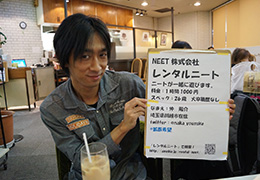
NEET Co., Ltd. is a company where all its members (close to 150 NEETs) have assumed office as directors of the company. Without setting detailed rules or appointing any leaders, this company is founded upon the bold concept of letting its members engage in trial and error, starting with nothing. It generated sales of just 920,000.
Ogawa: In truth, NEET Co., Ltd. is generating profits, isn’t it?
Wakashin: No, not at all. Annual sales in 2014 were a mere 920,000 yen. (Laughs) The original motive behind setting up the company was not to have adults prompt them to do something productive, but to have them experiment with their own motivation to create something, and find out what they can do when they come here involuntarily.
Ogawa: That is to say that the aim of the business is not to provide NEETs with job opportunities.
Wakashin: Yes. I have no intentions of rehabilitating them into society. Rather than bringing them closer to the traditionally ideal image of members of society, the significance of the initiative lies in how we develop an inherent sense of purpose and motivation that prompts them to work hard for values that are completely different from conventional values.
Ogawa: Even with external motives such as salary and status, NEETs may still not have the desire to work.
Wakashin: That is right. On the other hand, what is of interest is that despite being such an unprofitable company, most of the members did not quit when we renewed the list of directors in the last previous year. Instead, I even feel a sense of loyalty toward the company growing among them. This is not because of a reward given to them in return for their sacrificing themselves for the organization. Rather, I believe it was born of a “yurui sense of belonging” through their involvement and free participation in that community.
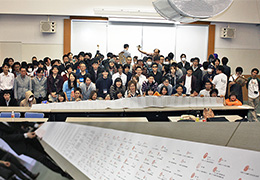
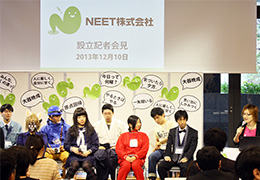
Ogawa: I have heard that you also have a job title, “Job-hunting Outlaw Recruitment/Narcissist Recruitment Producer.”
Wakashin: Yes. In fact, out of all the projects I am doing, this “Job-hunting Outlaw Recruitment/Narcissist Recruitment” business is now producing the most noteworthy results. This is a job-placement service dedicated to young people who have already graduated from college, failed to get on with the regular job hunting activities, or who took a detour from the “right” path. We are connecting them with companies interested in hiring them. Last year, 41 out of about 100 participants received informal job offers from the companies.
Ogawa: People who took a detour from the “right” path? (Laughs). However, informal job offers for close to half the number of participants is an impressive outcome. How are participants matched with their prospective employers?
Wakashin: First, we provide a yurui space called “soft chaos,” that allows the participants to speak freely about their any topics they like. By doing so, the participants naturally develop a sense of confidence and cooperative spirit. Recruitment representatives from the corporations are blended in with them, and converse with them about abstract themes such as “shame,” “desire,” and “money.” By doing so, the young people and the recruitment representatives somehow develop connections. Even the “scientific” youths who, at the first glance, appear to have communication disorders, were able to speak naturally in a space with “disorganized” surroundings, and even received informal job offers.
Ogawa: The chaotic situation eventually transformed into one that was not chaotic.
Wakashin: Instead of an order that I provide, I believe that a new and intriguing order is created in that space by the participants.
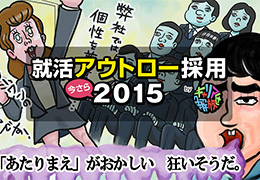
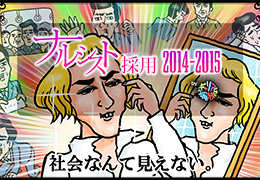
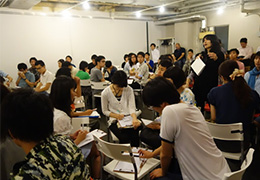
No education or training is provided in Job-hunting Outlaw Recruitment/Narcissist Recruitment business. The parties concerned create a “soft chaos” environment where they can speak and express themselves freely, and make connections between their own “maniac” selves and other people, as well as with the society.
Ogawa: The Sabae City Office JK Section initiative, in which female high school students participate in the revitalization of the town, has also been widely covered in the media.
Wakashin: The most important point about the JK Section concept is to create an atmosphere where normal citizens who have never even thought about urban planning (I call such people “yurui citizens”) can enjoy themselves. JKs are the representatives of these “yurui citizens.”
They do not have rigid mindsets, such as ideas about the revitalization of towns and development of community frameworks, that professionals and citizens who are strongly interested in community activities tend to have. I believe that creating a situation where adults who tend to consider urban planning in terms of theory are swayed by “yurui JK citizens” can develop new communication and a sense of “softness” in the community.
Ogawa: Indeed. This means that “yurui citizens” produce “soft chaos.” The result is changes in regional societies.
Wakashin: Yes. More than 20 projects and activities were created in a year, and covered close to 100 times on TV and in the newspapers. However, more than these PR effects, I think that the greatest results that we have reaped through this initiative were the awareness on the greater importance of learning together over teaching, the birth of a collaboration that goes beyond generations, and changes in the adults in the community. These were achieved by taking the bold step of making young people the central players, and to sway adults through that.
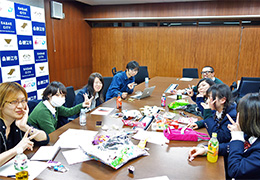
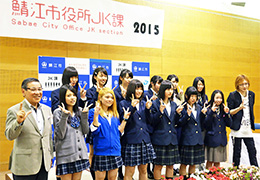
Despite the conventional concept that people can only attain adulthood if they are educated and managed by adults, this project takes a bold step in granting the leadership to youths, and creates opportunities for them to engage in activities together with adults, putting into practice the concept of “learning while teaching, teaching while learning.”
Ogawa: What type of initiatives has the JK Section come up with?
Wakashin: Last year, the library application called “Sabota” drew the most attention. This was an idea that members of the JK Section came up with, and allows users to somehow obtain information about the availability of individual desks at the library.
Ogawa: “Somehow” means that the information is not precise, doesn’t it? (Laughs)
Wakashin: Yes, it is “somehow.” (Laughs) Previously, users have had to call the library beforehand to make reservations, but with this application, they can “somehow” find out about the availability of the seats without calling the library.
Ogawa: Your keyword of “yurui” also applies here, doesn’t it?
Wakashin: Yes. Since a user can somehow see the availability of seats, they can easily decide on their actions, such as “I will not go to the library now since all the seats are taken up,” or “I will go now since there are quite a number of available seats.” If they use the telephone booking system, they would have had to first provide their names and contact information to make the reservation, and then would have had to call a second time if they decided not to go after all. To these girls, the previous system had been a very troublesome one. Based on the idea proposed by the JK Section, an actual system was developed in collaboration with local companies and students of municipal college and vocational institutes in the region.
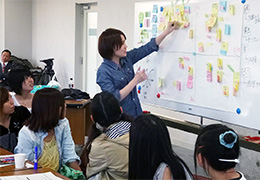
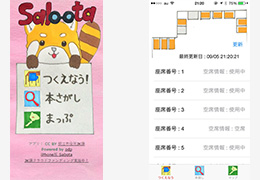
Ogawa: How do you regard the “yurui communication” that you have proposed?
Wakashin: It is often said that “Future communication should not be one-directional, but should be interactive,” or that “We should engage in proactive communication.” However, such concepts, imported from overseas, do not fit perfectly with the sense of trial and error that we go through in everyday life here.
Ogawa: It is true. People do not say “JK” in the United States. (Laugh)
Wakashin: When I explain the concept of doing things together to the NEETs and JKs, I always use the term “yurui.” I think that it is a superb expression. I am not involved in these projects in a paranoid or rigid way, but neither do I just leave them completely alone. Although there are some connections, we do not make decisions for them on methods and answers that are easy to grasp, but ponder over them together. That is my idea of “yurui.”
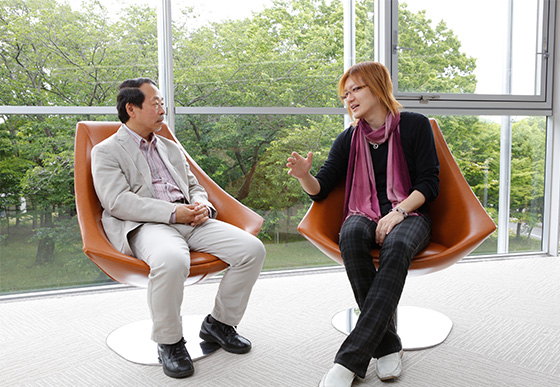
Ogawa: Even so, does it not require considerable patience to put your idea of “yurui communication” into practice from the standpoint of leaders and teachers?
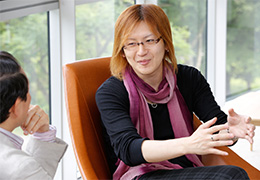
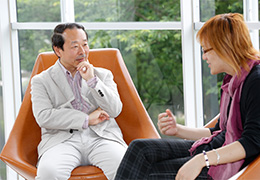
Ogawa: Don’t you have any thoughts of creating “spaces” for yurui communication at SFC?
Wakashin: Our current education system is one that is focused on problem solving, and follows the framework of certain military organizations whereby the teacher stands at the lectern and issues instructions to students. Moreover, even though everyone talks about how much they dislike such organizations and systems, they all become nervous when it comes to quitting. Even as they say that they do not want to be managed, they wish to be managed. It is a complicated situation.
Ogawa: There is no unifying force. Complete freedom is the same as a lack of freedom.
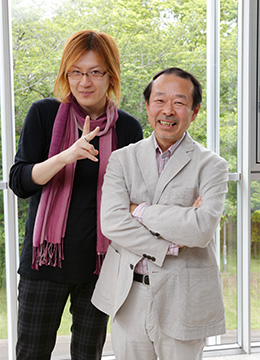
Wakashin: I believe that rather than searching for answers somewhere, it is vital for us to create “spaces” that allow us to continue searching and exploring in a light-hearted manner even though we do not know what the answer is. I think that SFC is an institution that allows us to conduct such research. I aim to make full use of this campus and develop various research projects going forward.
Ogawa: In future, there are plans at SFC to carry out an experimental education program called “Miraisozojuku.” In this program, teachers and students stay together for two to three weeks to tackle certain themes, and attempt to gain something through the experience. I think that the new style of communication that you have pointed out to us today can also provide many hints and ideas for such new educational initiatives.
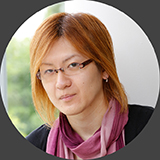
Yujun Wakashin
Project Research Associate, Graduate School of Media and Governance, Keio University. He is also a graduate of the Master’s program in the same graduate school. He specializes in communication theories between humans and organizations aimed at drawing out an inherent sense of purpose and diversity in people, and industrial and organizational psychology.
He leads the planning and implementation of numerous experimental projects, including NEET Co., Ltd. where all members are directors of the company, the Sabae City Office JK Section where female high school students take on leadership in reforming local government, and the Yurui Shushoku program where members can earn a monthly salary of 150,000 yen while not working four days a week.
(Japanese Only)http://wakashin.com/

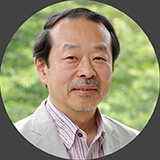
Katsuhiko Ogawa
Former Executive Director of the Keio Research Institute at SFC, and Professor, Faculty of Environment and Information Studies, Keio University. He is also a graduate of the Master’s program at the Graduate School of Engineering, Keio University. He specializes in communication design, theories of Internet society, and human interfaces.
In 2014,he won the “Best Paper Award Social Networking Service for Helping Each Other in the Neighborhoods”.
(Japanese Only)http://www.balab.jp/
2015.Oct.ISSUE